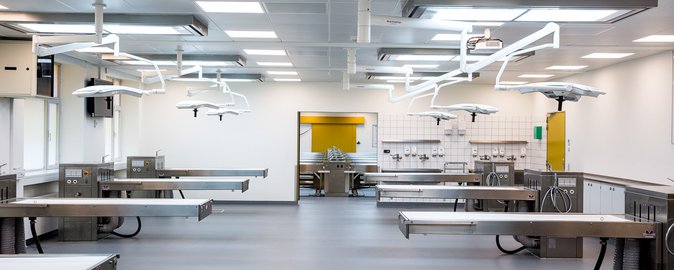- Education
-
Research
Current research
Talent
-
Collaboration
Businesses
Government agencies and institutions
Alumni
-
About AU
Organisation
Job at AU
After several years of construction work, the Department of Biomedicine's new dissection facilities have been inaugurated. Following a renovation costing more than DKK 40 million, and including a new operating theatre, the university now has the most modern facilities in Northern Europe at its disposal.
2016.11.15 |

The new operating tables provide better conditions and new opportunities for the surgeons who take further and continuing education courses at AU. Photo: Lars Kruse, Aarhus University
A hearse regularly parks in front of a garage on Bartholins Allé. Otherwise, there is not much to indicate what goes on in the basement under the anatomy building, also called Grønnegården. On 3 November, the doors were thrown open to an inauguration, where anyone with an interest had the opportunity to see the basement, which is now ready after several years of renovation.
This work has resulted in new dissection facilities for the medical students, who learn about how the human anatomy looks in reality already during the second semester of their degree programme.
"For many people, this is a place that seems slightly mysterious and scary. But for us and our medical students, it is a very central part of the medical degree programme – and, not least, a central part of the formation of the coming medical doctors. This is where they come into direct contact with human body for the first time, and where they have those first important experiences on the educational journey that leads to becoming a skilled doctor," said Thomas G. Jensen, department head at Biomedicine, during his speech at the inauguration.
With the renovation, there is now space for a new operating theatre with operation-like facilities. Here, surgeons can train on deceased persons who have donated their body to research and teaching, before the doctors face living patients on the operating table.
There are nine custom-made operating tables designed to resemble everyday clinical reality as much as possible, while at the same time being practical in relation to handling the deceased. The tables are narrow like proper operating tables, they can be raised and lowered, have operation lamps and can also be x-rayed, making it possible to see the result of an operation. The operations can also be streamed to large screens in the room and in an adjoining lecture theatre, so the training can be followed by others.
So far, otorhinolaryngology doctors and orthopaedic and abdominal surgeons from Denmark and abroad have utilised the opportunity to try out or learn new surgical techniques, refresh skills, or use the facilities for research.
"The new facilities provide new and improved opportunities to offer increased further and continuing education for surgeons. This is an area that we wish to further develop over time," said acting dean of Health, Ole Steen Nielsen, during the inauguration.
The reason behind the renovation was a wish for a better work environment for the sake of the medical students and, in particular, for the employees who work in the basement on a daily basis.
"I am pleased that the employees who do such a great and tremendous job every day now have modern facilities, which ensure a good work environment with less heavy lifting and better ventilation. Furthermore, we now have Northern Europe's most modern dissection facilities at our disposal," said Ole Steen Nielsen.
Training and further and continuing education of medical doctors is possible thanks to the many Danes who donate their body to education and research. There have been dissection facilities at AU since probably the 1950s. However, dissection first became part of the medical degree programme in the 1970s.
_______________________________________________________________________________________
Department Head Thomas G. Jensen
Department of Biomedicine, Aarhus University
Mobile: (+45) 2778 2805
thomas@biomed.au.dk